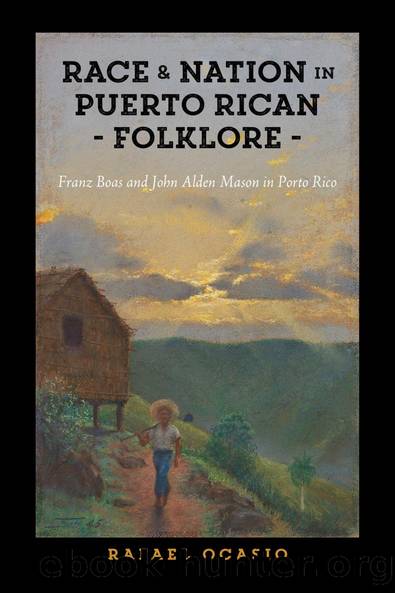Race and Nation in Puerto Rican Folklore by Rafael Ocasio

Author:Rafael Ocasio [Ocasio, Rafael]
Language: eng
Format: epub
Tags: History, General, Caribbean & West Indies, Social Science, Folklore & Mythology, Indigenous Studies, Anthropology, Cultural & Social
ISBN: 9781978810228
Google: mHrtDwAAQBAJ
Publisher: Rutgers University Press
Published: 2020-08-14T01:43:47+00:00
Beware of Strangers: No One Can Be Trusted, Not Even Your Own Relatives
Hard-earned lessons are indeed an integral part of moral stories that reflected the pervasive distrust of strangers in jÃbaro culture. Tales of enchantment often warned naïve protagonists of the evil of innocent-looking strangers who should not be trusted, even if they are seemingly harmless, weak or even elderly. A striking characteristic of these stories is the frequency of warnings against oneâs own family members: parents and siblings, in particular, can be foes. In âLa mata de ajÃâ (The Sweet Pepper Plant), for instance, a jÃbara mother leaves her daughter in charge of her house, cautioning her to keep an eye on three beautiful figs ripening on the dining table. Before leaving the house, the mother utters a terrible warning: if any of the figs are missing upon her return, she will kill the daughter. Shortly after, an old woman shows up unannounced to the house, tricking the girl into fetching her some salt so she can steal a fig. Twice old ladies came into the house with similar requests, leading to the disappearance of the remaining figs.
Upon her return and after finding her three figs missing, the angry mother does not verbalize her disappointment. She merely digs a deep trench in a field ready for cultivation and, after throwing her ring into it, orders her daughter to fetch it. While the girl is busily digging for the ring, her mother fills the trench, successfully burying her alive.24 After a few minutes, a pepper plant magically springs up, marking the place where the girl had been buried.
When he returns from the fields, the girlâs father asks for his daughter, whose whereabouts are flippantly dismissed by the mother. The father then notices the lush, mature pepper plant that was not present hours earlier. Puzzled, he orders his son to inspect the plant. The series of events that follow are reminiscent of similar stories in which protagonists are buried alive and turned into plants that immediately produce lush fruits or flowers. They are also samples of âsingingâ stories, displaying choruses that serve the buried protagonists as their way of denouncing the person responsible for their demise. When the brother plucks a ripe pepper, the plant bitterly sings, warning him to stop pulling his sisterâs hair. The plant also names the mother responsible for her murder.
Horrified, the brother returns home and tells his father about the information gathered from his sisterâpepper plant. Upon hearing the anecdote, the livid mother leaves the house in order to confirm her sonâs story. Following her sonâs example, after she serves herself a pepper, the singing chorus directly implicates her in the murder: âtú misma me has enterrado por tres higos que han faltadoâ (You yourself have buried me because of three missing figs; 558).
The moral of the story is reflected in the sudden dénouement of the plot. The father hurriedly begins digging at the root of the pepper plant finding that âresultó que por casualidad la muchacha no habÃa muertoâ (by chance the girl had not died; 558).
Download
This site does not store any files on its server. We only index and link to content provided by other sites. Please contact the content providers to delete copyright contents if any and email us, we'll remove relevant links or contents immediately.
Barkskins by Annie Proulx(3367)
Cuba by Lonely Planet(2629)
Binging with Babish by Andrew Rea(1411)
Jamaica by Lonely Planet(1401)
Fodor's Japan by Fodor's(1384)
The Duppy by Anthony C. Winkler(1348)
Caribbean by James A. Michener(1343)
Moon Guatemala (Moon Handbooks) by Argueta Al(1334)
Puerto Rico by Unknown(1330)
Gorky Park by Martin Cruz Smith(1330)
Havana Fever by Leonardo Padura(1299)
Fodor's Barcelona (Full-color Travel Guide) by Fodor's(1270)
A Trip to the Beach by Melinda Blanchard(1239)
The World Is Moving Around Me: A Memoir of the Haiti Earthquake by Dany Laferriere(1196)
The Girl With the Golden Shoes by Colin Channer(1181)
The World is Moving Around Me by Dany Laferriere(1166)
Never the Hope Itself by Gerry Hadden(1153)
The Spice Necklace: My Adventures in Caribbean Cooking, Eating, and Island Life by Vanderhoof Ann(1133)
A Voyage to Virginia in 1609 by Strachey William; Jourdain Silvester; Wright Louis B(1133)
